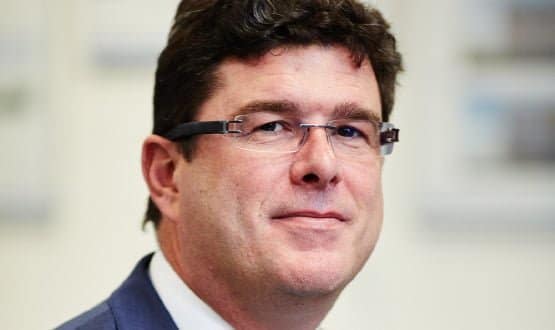TPP founder recognises past mistakes but wants to be more accessible
- 23 January 2020

TPP is a clinical records specialist which, along with EMIS, dominates the GP electronic patient record market. The founder sat down with Digital Health News to talk about certain perceptions that surround him and why he wants to build on making the IT company more accessible in the future, ahead of Rewired 2020.
TPP is a UK clinical records specialist. The company grew during the early 2000s under the NHS National Programme for IT (NPfIT) era, beginning in secondary care, connecting hospital to primary care for diabetes.
TPP’s solution involves having multiple organisations on a single shared version of its SystmOne records software. The software is currently used by over 7,000 NHS organisations and by over 230,000 clinical and administrative staff. Whilst best known for the scale of their GP deployments, TPP also have software in more than 50% of UK community services, 50% of child health services, in over 25% of mental health trusts and in over 60 acute trusts.
The company’s CEO, Frank Hester, is one of the few founders and owners left in an NHS IT market dominated by stock market-listed companies.
Front-line inspiration
Being married to a GP provided Hester with the inspiration for founding TPP back in 1997.
“My wife at the time was a GP – and I could see her struggling with lack of IT,” he says adding that his wife spent a lot of time on administrative tasks.
Before TPP was founded, Hester worked as a senior technical architect at Halifax Building Society.
Shortly after he left Halifax, he started writing code in his bedroom.
“Through my banking experience I knew the NHS was really quite a long way behind in use of IT, and that this technology could make a real difference to patient care,” Hester says.
The NPfIT effect
Just a few years after the company formed, they caught a lucky break. The NHS had embarked on a £12 billion programme of IT modernisation, awarding billion-pound contracts to regional prime contractors who were desperate for software they could install and get paid for.
After concerns were raised about Lorenzo, TPP’s SystmOne product was chosen in the Accenture regions and deployed to thousands of organisations. This roll-out continued when CSC took over from Accenture.
This meant the National Programme for IT (NPfIT), which launched in 2002, became the absolute focus for TPP.
“Nothing else really existed for us in the world at that time. We had to do everything we were contracted to do under NPfIT, and we did,” Hester says.
Addressing the problems
In the last stages of the collapse of the NPfIT, Hester suggests there were “some pretty silly ideas”, and says he wasn’t shy about telling people so.
“I won’t say I handled all these things in the most mature way, but I felt I had to deliver a system for my wife and friends who were doctors and nurses. That was my goal,” he adds.
However, this did lead to perceptions of Hester being difficult.
When asked about this, Hester told Digital Health that this was primarily about the company’s failures with communication.
This meant it was not always clear to people why TPP objected to some of the proposed solutions, both on technical and patient safety grounds.
Hester admits this was one of the company’s main “weaknesses”.
The reputation issue
The CEO acknowledges that there are other reasons for his reputation of being difficult to work with, and of being a blocker of interoperability.
He says that the company has always refused to blindly follow proposed technical strategy, particularly if they don’t believe it will actually deliver benefits to patients and doctors.
He adds that the company remains an SME, with 140 employees, and so have always had to focus on what they see as the biggest priorities for delivering better technology across the NHS.
“Did I think our system was the best system? Yes. Did I think was the best for the NHS? Yes,” Hester adds.
“I wanted it [the system] to be in as many places as possible, but it was always going to have to be interoperable.
“We’ve let others tag us as being against interoperability, but we’re really not.”
What TPP has been, he acknowledges, is critical at times on the technical approaches that have been developed nationally on interoperability.
Bright future?
Hester believes that the country is “seeing some improvements” with regards to interoperability, and welcomes the introduction of NHSX to drive this.
He says that specifications for structured data items that suppliers can write to have now been delivered; these are national specifications rather than bespoke local solutions.
Hester also points to the recent national interoperability programmes on GP Connect views, cross-organisation appointment booking, and digital medicines, all of which TPP have been first to deliver on.
“Historically, I have been frustrated with interoperability progress over the years, though developments in 2019 have left me feeling much more optimistic,” he says.
In 2020, TPP is looking to try and engage more with the healthcare community, which includes Hester taking to the stage as a keynote speaker at Digital Health Rewired 2020 on 4 March. TPP is also the conference sponsor for the interoperability track.
“I am very excited to be talking at one of the largest healthcare conferences in the UK,” he says. “It is the first time I have taken to the national stage to talk about interoperability and to communicate why I see it as such a fundamental part of the NHS of the future.”
Register your place at Rewired 2020 today.






1 Comments
I have a ticket for this, thank God. ELECTRIFYING. Cant wait.
Comments are closed.